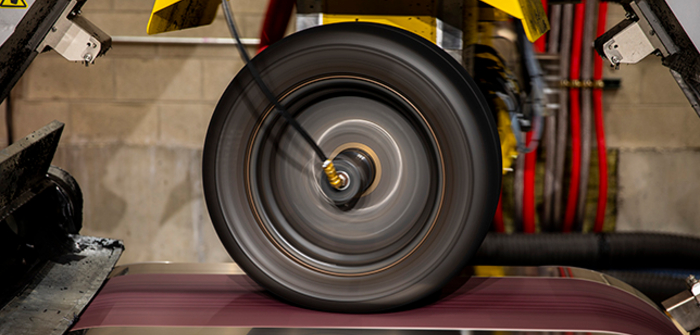A new report from Smithers, the multinational provider of testing, consulting, information, and compliance services, has identified the top 20 technologies that will transform the global tire industry across the next two decades. The trends identified range from new materials to smart driving concepts.
The Future of Disruptive Technologies in the Tire Industry to 2040 report is based on an exclusive survey of technical experts, business leaders and opinion formers in the global tire industry. Multiple potentially disruptive innovations were identified – covering tire design and raw materials, as well as key enabling technologies such as improved sensor platforms and virtual design modeling – that the tire industry can leverage to meet the future demands of OEMs, regulators, and drivers.
The top seven tire-specific disruptive technologies identified by Smithers’ in-depth survey are:
- Advance smart tires: The adoption of enhanced sensor platforms will push the envelope for safety in driving, as well as providing critical maintenance and performance data for fleet managers;
- Basic smart tires: Tire pressure monitoring systems (TPMSs) will increasingly be improved and integrated into vehicles so that low pressure is not just detected, but corrected automatically;
- Innovative elastomer synthesis methods: Synthesis and commercialization of synthetic elastomers has been a foundation of improved tire performance since the 1930s. This evolution will continue, but may be disrupted by new grades such as Bridgestone’s gadolinium-catalyzed polyisoprene, which the company says can have equivalent or better performance than natural rubber;
- New carbon black manufacturing technology: There is an emphasis on cutting the environmental footprint of carbon black grades used in tires. The most disruptive potential trend for this vital material is converting sustainably sourced wood biomass into carbon black;
- Non-pneumatic tires (NPTs): Multiple tire companies have devoted R&D to this concept with Michelin scheduled to introduce these for GM vehicles in 2024;
- Self-healing polymers: Still at the R&D phase, this class of smart materials are polymers that can respond to damage by ‘healing’ themselves. For example, a recent Harvard University study describes a self-healing elastomer that has the fracture toughness of natural rubber and can self-heal to 30% of its original strength in 12 hours at room temperature;
- Substitution of materials of high concern: Chemicals that play a critical role in tire performance, such as cobalt salts and PPD-based antiozonants, are coming under increased regulatory pressure in many jurisdictions. Simultaneously there is rising concern over pollution caused by tire wear particles. This is creating a challenge to find less harmful alternatives that do not compromise key tire performance properties.
These will be refined and adopted over the next 20 years, according to Smithers, whose report provides scorecards for each of the 20 technologies profiled, including detailed scores for their disruptive potential in 2020, 2030, and 2040.
Analysis for the report tracks how these will meet the two core future demands for improved safety and improved sustainability, as new mobility concepts enter the market.
The tire industry is traditionally conservative, Smithers says. This research is especially timely as the tire industry responds to an unprecedented downturn in H1 2020, and leading tire manufacturers reappraise their R&D priorities to return to profitability in a global economy radically reshaped by the Covid-19 pandemic.
To fully contextualize the evolution of the disruptive technologies and their route to market The Future of Disruptive Technologies in the Tire Industry to 2040 includes forecast scenarios of how the tire industry will look in 2040, including consideration of key long-term trends.
These combine to give essential strategic insight for companies at every stage of the tire value chain, from raw material producers to tire manufacturers and OEMs.
The full report is available to purchase now on the Smithers website.



